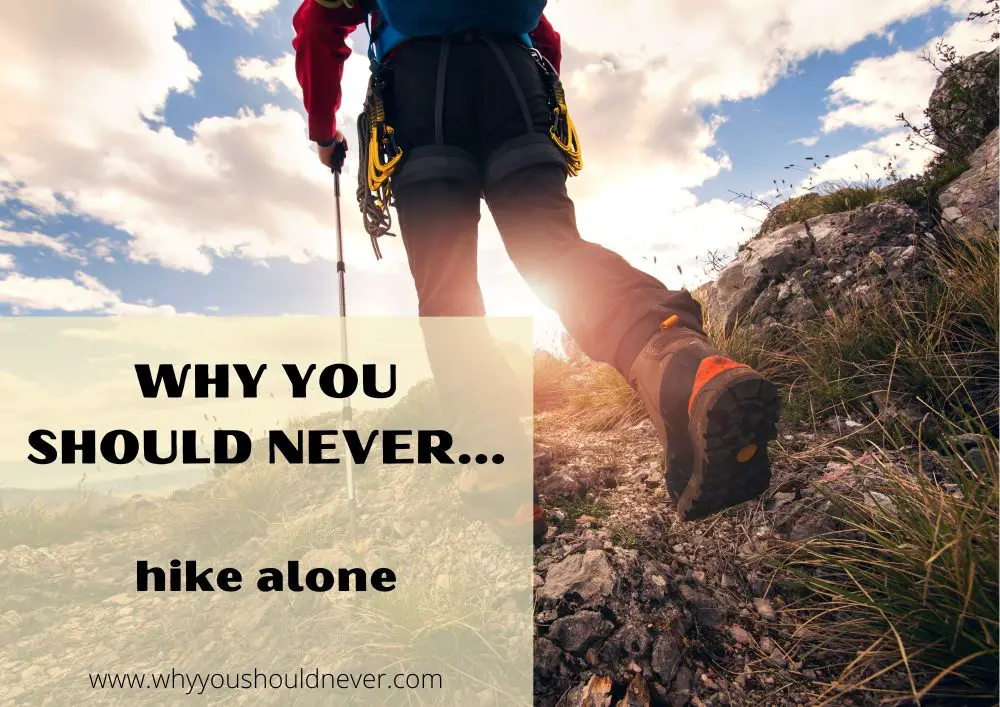![]()
Why You Should Never Hike Alone
Hiking alone can be very therapeutic, there’s no denying it. Getting lost in nature for a few hours every now and then, with no one around to disturb you, is good for the soul.
However, this solitude can bring with it many challenges. The wilderness is an unpredictable, sometimes unforgiving place where anything can happen. Dangers are exacerbated when you’re alone; lots of things can, and do, go wrong.
In this article, we discuss some of the risks involved in hiking alone, so you can decide for yourself if your desire for isolation is worth the trouble.
The risk of injury
It’s easy to get hurt when hiking alone. Though Earth is beautiful in its natural state, it is also full of treacherous inclines, steep hills, rocky valleys, slippery slopes… terrains that look glorious but can be lethal to anyone traversing them.
You might trip and fall, cutting yourself on a sharp rock. Or worse, you could slip off a cliff, breaking several bones, leaving you unable to walk and find help. If these things happen while you’re alone in a remote place, it’s unlikely that you’ll be found and rescued.
Even if you bring your cellphone along, you probably won’t get any signal, and thus can’t call for help.
You could get lost
There’s a certain appeal to getting lost in the wild by yourself, with only your thoughts to keep you company. But “getting lost” in the literal sense isn’t exactly what we have in mind when we’re seeking peace and quiet. Generally, we want to be able to find our way back.
If you forget your map, or can’t even read one, you could easily get lost while hiking alone. This is especially difficult if the weather turns bad and visibility is low. In severe conditions, you wouldn’t be able to make out any landmarks or other markers used to guide you back home.
The risk of animal attacks
Once you step into nature, you might be walking into the territory of mountain lions, bears, wolves, or a number of other ferocious predators looking for prey. Because you’re on your own, they’ll see you as an easy meal. Their odds of defeating you are high.
You stand a far better chance of surviving a bear or wolf attack if you hike with others. Just having another person with you could mean that any wild animals feel more intimidated and won’t try to attack you.
Or, at the very least, you can make a quick escape while the bear is eating your hiking buddy!
Other people bring their survival skills with them
No one is good at everything, which is why people need each other.
If something untoward happens and you find yourself stranded in the middle of nowhere, you’ll need to be able to forage food, keep warm, find clean water etc. If you don’t have those skills, you may starve or die of dehydration.
Perhaps you get bitten by something poisonous – like a snake – and you need someone to suck out the venom before it seeps into your bloodstream. A bite to your ankle would be impossible for you to suck out yourself, but a hiking buddy would be able to.
No one to help with the heavy lifting
Growing fatigued while hiking is common, and you might need some help carrying your backpack or other equipment if you get too tired or hurt yourself.
If you’re alone, no one will be there to take the load off temporarily while you regain your strength.
No one to take pictures
If you’re hiking alone, there will be no one to take pictures of you posing in front of famous mountains or a beautiful, picturesque horizon.
While technology has evolved and we can now use selfie sticks to capture ourselves in our element, it simply isn’t the same, and you’ll be limited in the types of photos you can take.
It can sometimes get lonely
Although you might initially enjoy the solitude of hiking alone, it can get boring and lonely after a while. Sometimes it’s good to have a companion by your side, someone with whom you can marvel at the beautiful landscape.
What to do if hiking alone
So, you’ve read the risks but you’ve decided to go it alone anyway. Well, if you’re new to this, here are a few things you need to do to ensure your safety.
- Plan your route thoroughly before you leave
- Tell someone your route – mark it on a map for them
- Take your cellphone with you – it can act as a torch, if not a means of communication
- Bring plenty of water
- Bring a weapon for utility and protection – a knife can be used for both
- Travel as lightly as you can, so you don’t easily tire
